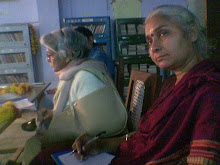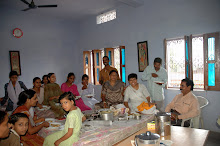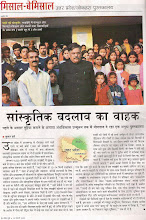
1993 से लेकर 2004 तक की यात्रा में जो खास कमी बडी शिद्दत से महसूस की जाती थी, वह थी लड्कियों और महिलाओं की पुस्तकालय की गतिविधियों मे बहुत कम भागीदारी ! 2004 में अचानक एक घटना ने पूरा परिदृश्य बदल दिया ! सब कुछ बिना किसी सोची समझी रणनीति के तहत हुआ ! राष्ट्रीय नाट्य विद्यालय नई दिल्ली ने मई 2004 मेँ पहली बार एक महीने का ट्रेनिंग कम प्रोडक्शन वर्कशाप पुस्तकालय परिसर में आयोजित किया ! "पूर्वी उत्तर प्रदेश के इस पिछडे गाँव में नाटक करने के लिये लड्कियाँ कहाँ से मिलेंगी?" प्रशिक्षिका विधु खरे ने लखनऊ से जोकहरा जाते हुये हैरानी से पूछा ! विधु की हैरानी निराधार भी नहीं थी ! शुरू के तीन दिन एक भी लडकी कार्यशाला मेँ भाग लेने नहीं आयी ! लेकिन विधु के थोडे से प्रयास के बाद जो कुछ हुआ वह अकल्पनीय था ! अलग अलग उम्र जातियों एवँ पारिवारिक पृष्ठभूमि की लडकियों ने जब आना शुरु किया तो ऐसा लगा कि कोई बाँध टूट गया हो ! सचमुच बाँध ही तो टूटा था ! तरह तरह की कुँठाओं और वर्जनाओं की मारी इन लडकियों को एक बार जब अपनी कल्पना के पँख पसारने का मौका मिला तो वे उड चलीं उस सम्मोहक और रंग बिरंगी दुनियाँ की तरफ जिसमे अभी तक उनका प्रवेश वर्जित था ! वर्कशाप मे तीस से अधिक प्रतिभगियों के भाग लेने की गुंजायश नहीँ थी किंतु मना करते करते भी विधु को 47 लडके लडकियों को इसमे दाखिल करना पडा ! नाटक की यह कार्यशाला लडकियो और आसपास के ग्रामीण जीवन के अनुभव संसार में एक भूचाल की तरह थी ! पूर्वी उत्तर प्रदेश देश के अन्य पिछडे ग्रामीण इलाकोँ की तरह लैँगिक और जातीय भेद भाव से ग्रस्त है ! इस वर्कशाप से पहले यह कल्पना करना भी मुश्किल था कि लडके लडकियाँ , खास तौर से दलित और सवर्ण पृष्ठभूमि के , एक साथ हाथ से हाथ मिलाकर नाचेंगे ,गायेंगे और अभिनय करेंगे ! इस वर्कशाप में विधु खरे के निर्देशन में तैयार लक्ष्मी नारायण मिश्र का नाटक सरयू की धार, राष्ट्रीय नाट्य विद्यालय, नई दिल्ली के रंगमंच पर जश्नेबचपन के तहत खेला गया !

जोकहरा से दिल्ली की यात्रा ने भी भाग लेने वाले कलाकारोँ की जिन्दगी को बदला ! कलाकारों में आधे से अधिक की ये पहली रेल यात्रा थी और दो एक को छोडकर बाकी सभी पहली बार दिल्ली जा रहे थे ! विधु खरे ने यात्रा के दौरान अलग अलग जातियों के बच्चों द्वारा लाया गया भोजन एक मे मिला दिया और बाद मे सबने उसे मिल बाँट कर खाया !महानगरों के लिये तो यह एक सामान्य सी स्थिति हो सकती है किंतु गलीज़ वर्ण व्यवस्था के पंक में बजबजाते समाज के लिये यह एक बडी परिवर्तन कारी घटना थी !
थियेटर के इस पहले वर्कशाप ने ही औरतोँ की जिँदगी मेँ निर्णायक हस्तक्षेप प्रारम्भ कर दिया ! वर्कशाप के पहले बहुत कम संख्या मेँ लडकियाँ /महिलाएँ पुस्तकालय मेँ आतीँ थीँ , जो आतीँ भी थी वे सहमी ,सकुचाई और अनामंत्रित सी लगती थीँ ! वर्कशाप समाप्त होने के बाद उनकी संख्या तो बढी ही उनके आत्मविश्वास का स्तर भी बढ गया ! बढा हुआ आत्मविश्वास उनके चलने, बोलने और अधिकार के साथ पुस्तकालय का उपयोग करने मे झलकने लगा !
मई 2004 के इस पहले वर्कशाप के बाद पुस्तकालय ने प्रति वर्ष तीन ट्रेनिंग कम प्रोडक्शन वर्कशाप लगाने का फैसला किया और इस अभियान मे उसे राष्ट्रीय नाट्य विद्यालय नई दिल्ली, उत्तर मध्य सांस्कृतिक केन्द्र इलाहाबाद , भारतेन्दु नाट्य अकादमी लखनऊ तथा इप्टा का सहयोग मिलता रहा है !
यदि आपको देखना हो कि थियेटर कैसे औरतोँ की जिन्दगी मेँ परिवर्तनकारी हस्तक्षेप करता है तो आपको श्री रामानन्द सरस्वती पुस्तकलय के अनुभवोँ का देखना चहिये !















.jpg)












